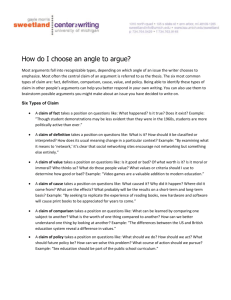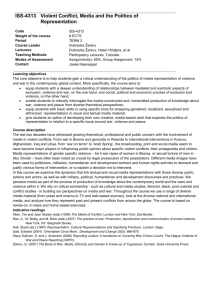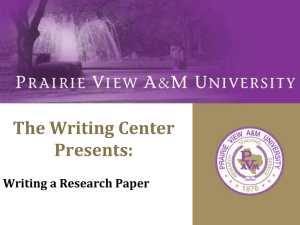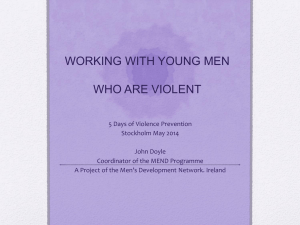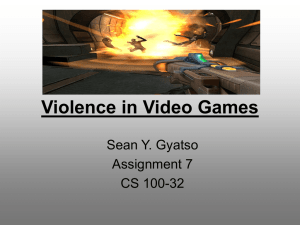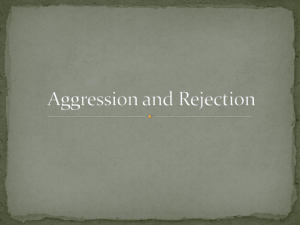Psych 507A: Statistical Methods in Psychology
advertisement
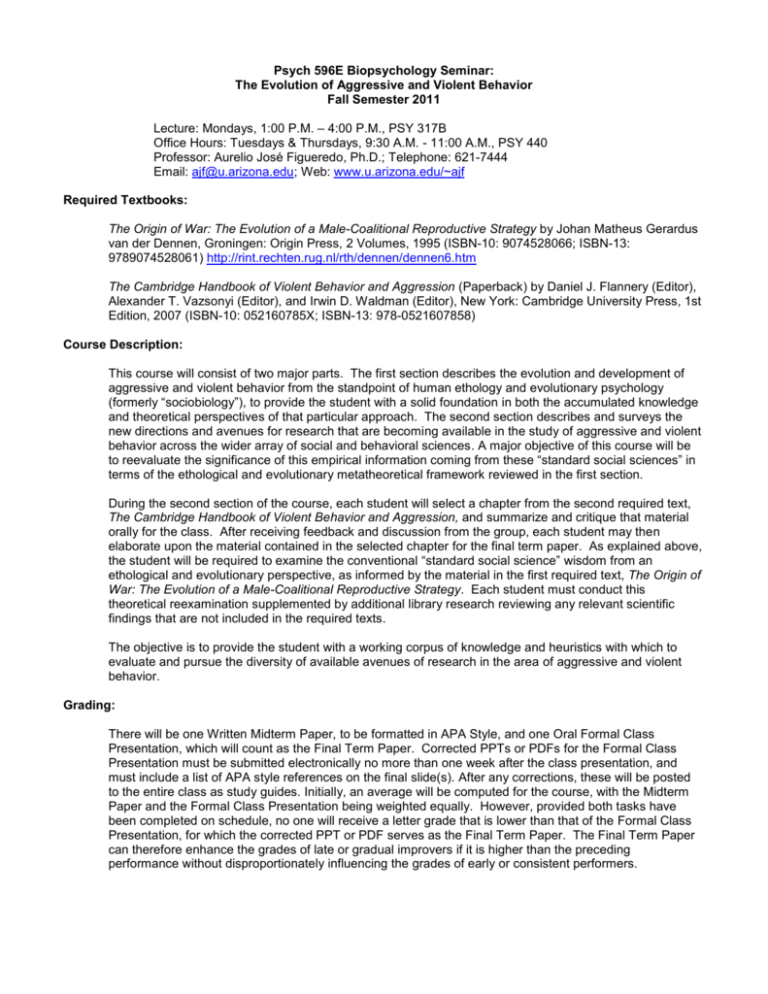
Psych 596E Biopsychology Seminar: The Evolution of Aggressive and Violent Behavior Fall Semester 2011 Lecture: Mondays, 1:00 P.M. – 4:00 P.M., PSY 317B Office Hours: Tuesdays & Thursdays, 9:30 A.M. - 11:00 A.M., PSY 440 Professor: Aurelio José Figueredo, Ph.D.; Telephone: 621-7444 Email: ajf@u.arizona.edu; Web: www.u.arizona.edu/~ajf Required Textbooks: The Origin of War: The Evolution of a Male-Coalitional Reproductive Strategy by Johan Matheus Gerardus van der Dennen, Groningen: Origin Press, 2 Volumes, 1995 (ISBN-10: 9074528066; ISBN-13: 9789074528061) http://rint.rechten.rug.nl/rth/dennen/dennen6.htm The Cambridge Handbook of Violent Behavior and Aggression (Paperback) by Daniel J. Flannery (Editor), Alexander T. Vazsonyi (Editor), and Irwin D. Waldman (Editor), New York: Cambridge University Press, 1st Edition, 2007 (ISBN-10: 052160785X; ISBN-13: 978-0521607858) Course Description: This course will consist of two major parts. The first section describes the evolution and development of aggressive and violent behavior from the standpoint of human ethology and evolutionary psychology (formerly “sociobiology”), to provide the student with a solid foundation in both the accumulated knowledge and theoretical perspectives of that particular approach. The second section describes and surveys the new directions and avenues for research that are becoming available in the study of aggressive and violent behavior across the wider array of social and behavioral sciences. A major objective of this course will be to reevaluate the significance of this empirical information coming from these “standard social sciences” in terms of the ethological and evolutionary metatheoretical framework reviewed in the first section. During the second section of the course, each student will select a chapter from the second required text, The Cambridge Handbook of Violent Behavior and Aggression, and summarize and critique that material orally for the class. After receiving feedback and discussion from the group, each student may then elaborate upon the material contained in the selected chapter for the final term paper. As explained above, the student will be required to examine the conventional “standard social science” wisdom from an ethological and evolutionary perspective, as informed by the material in the first required text, The Origin of War: The Evolution of a Male-Coalitional Reproductive Strategy. Each student must conduct this theoretical reexamination supplemented by additional library research reviewing any relevant scientific findings that are not included in the required texts. The objective is to provide the student with a working corpus of knowledge and heuristics with which to evaluate and pursue the diversity of available avenues of research in the area of aggressive and violent behavior. Grading: There will be one Written Midterm Paper, to be formatted in APA Style, and one Oral Formal Class Presentation, which will count as the Final Term Paper. Corrected PPTs or PDFs for the Formal Class Presentation must be submitted electronically no more than one week after the class presentation, and must include a list of APA style references on the final slide(s). After any corrections, these will be posted to the entire class as study guides. Initially, an average will be computed for the course, with the Midterm Paper and the Formal Class Presentation being weighted equally. However, provided both tasks have been completed on schedule, no one will receive a letter grade that is lower than that of the Formal Class Presentation, for which the corrected PPT or PDF serves as the Final Term Paper. The Final Term Paper can therefore enhance the grades of late or gradual improvers if it is higher than the preceding performance without disproportionately influencing the grades of early or consistent performers. Chapter 1 2 3 4 5 6 7 8 Chapter part i: 1 2 3 part ii 4 5 6 7 8 9 10 part iii: 11 PSYCHOLOGY 596E READINGS FOR FALL 2011 The Origin of War: The Evolution of a Male-Coalitional Reproductive Strategy The Origin of War: Introduction The Concept and Characteristics of War in Primitive Societies Nonhuman Intergroup Agonistic Behavior and `Warfare' Biological and Ecological Theories of the Origin and Evolution of War Cultural Theories and Proximate-Level Explanations of Primitive War Of Badges, Bonds and Boundaries: Ethnocentrism, Xenophobia and War The Politics of Peace in Primitive Societies: The Adaptive Rationale behind Corroboree and Calumet By Way of Summary: An Evolutionario The Cambridge Handbook of Violent Behavior and Aggression general perspectives Understanding Violence Patrick H. Tolan Origins of Violent Behavior over the Life Span David P. Farrington A Review of Research on the Taxonomy of Life-Course Persistent Versus Adolescence-Limited Antisocial Behavior Terrie E. Moffitt biological bases of violence Behavior-Genetics of Criminality and Aggression Soo Hyun Rhee and Irwin D. Waldman The Genetics of Aggression in Mice Stephen C. Maxson and Andrew Canastar The Psychophysiology of Aggression: Autonomic, Electrocortical, and Neuro-Imaging Findings Christopher J. Patrick and Edelyn Verona Biosocial Bases of Violence Angela Scarpa and Adrian Raine Neurobiology of Impulsive Aggression: Focus on Serotonin and the Orbitofrontal Cortex Royce Lee and Emil F. Coccaro The Neuropsychology of Violence Jean R. S´eguin, Patrick Sylvers, and Scott O. Lilienfeld The Interaction of Nature and Nurture in Antisocial Behavior Kenneth A. Dodge and Michelle R. Sherrill individual factors and violence Relational Aggression and Gender: An Overview Nicki R. Crick, Jamie M. Ostrov, and Yoshito Kawabata 12 13 14 15 16 part iv: 17 18 19 20 21 22 23 24 25 26 part v: 27 28 Personality Dispositions and the Development of Violence and Conduct Problems Benjamin B. Lahey and Irwin D. Waldman Personality and Violence: The Unifying Role of Structural Models of Personality Daniel M. Blonigen and Robert F. Krueger Exposure to Violence, Mental Health, and Violent Behavior Daniel J. Flannery, Mark I. Singer, Manfred van Dulmen, Jeff M. Kretschmar, and Lara M. Belliston Social-Cognitive Processes in the Development of Antisocial and Violent Behavior Gregory S. Pettit and Jacquelyn Mize School Violence Gary D. Gottfredson and Denise C. Gottfredson interpersonal factors and violent behavio r Peers and Violence: A Two-Sided Developmental Perspective Frank Vitaro, Michel Boivin, and Richard E. Tremblay Youth Gangs and Violent Behavior Scott H. Decker Family Violence Richard J. Gelles Youth Violence Across Ethnic and National Groups: Comparisons of Rates and Developmental Processes Alexander T. Vazsonyi, Elizabeth Trejos-Castillo, and Li Huang Adolescent Dating Abuse Perpetration: A Review of Findings, Methodological Limitations, and Suggestions for Future Research Vangie A. Foshee and Rebecca A. Matthew Social Networks and Violent Behavior Dorothy L. Espelage, Stanley Wasserman, and Mark S. Fleisher Public Health and Violence: Moving Forward in a Global Context Linda L. Dahlberg Cross-National Research on Violent Victimization Johan van Wilsem Violent Juvenile Delinquency: Changes, Consequences, and Implications James C. Howell and Megan Q. Howell Strain Theory and Violent Behavior Robert S. Agnew contextual factors and violent behavior Self-Control Theory and Criminal Violence Michael R. Gottfredson Why Observing Violence Increases the Risk of Violent Behavior by the Observer 29 30 31 32 33 34 35 36 part vi: 37 38 39 part vii 40 41 L. Rowell Huesmann and Lucyna Kirwil Violence and Culture in the United States Mark Warr Terrorism as a Form of Violence Kevin J. Strom and Cynthia Irvin Therapeutic Treatment Approaches to Violent Behavior Richard E. Heyman and Amy M. Smith Slep Psychopharmacology of Violence Markus J. P. Kruesi Social Learning and Violent Behavior Gary F. Jensen Substance Use and Violent Behavior Jeff M. Kretschmar and Daniel J. Flannery Poverty/Socioeconomic Status and Exposure to Violence in the Lives of Children and Adolescents Holly Foster, Jeanne Brooks-Gunn, and Anne Martin Social Contagion of Violence Jeffrey Fagan, Deanna L. Wilkinson, and Garth Davies methods for studying violent behavior Studying Aggression with Structural Equation Modeling Noel A. Card and Todd D. Little Overview of a Semi-Parametric, Group-Based Approach for Analyzing Trajectories of Development Daniel S. Nagin Relocating Violence: Practice and Power in an Emerging Field of Qualitative Research Bowen Paulle looking toward the future Violent Behavior and the Science of Prevention Albert D. Farrell and Monique Vulin-Reynolds New Directions in Research on Violence: Bridging Science, Practice, and Policy Daniel J. Flannery, Alexander T. Vazsonyi, and Irwin D. Waldman

